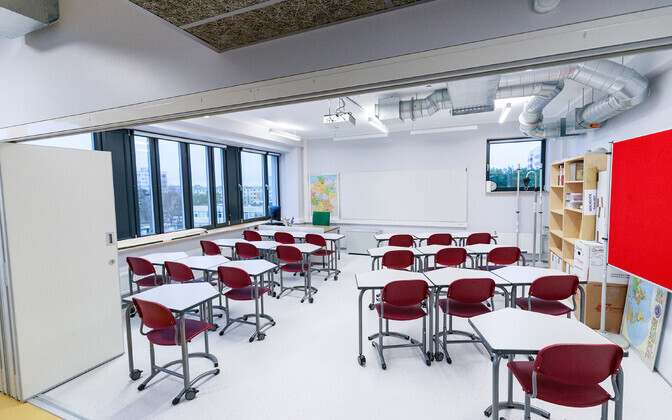A full-scale war has been raging in Ukraine for more than three years. Tens of thousands of Ukrainians have fled to Estonia, including many children and young people. A young person with a refugee background is a completely normal young person – just in an unusual situation. They have lost their previous life and sense of security. They miss their friends, loved ones and familiar activities. On top of that, an unfamiliar culture and language make it difficult for them to adapt to a new country.
According to data from the Estonian Education Information System (EHIS), as of May this year, a total of 9,260 Ukrainian children and young people were participating in the Estonian education system, which includes basic, general and vocational education. The EHIS data shows that only 385 Ukrainian school-age children were unable to fulfill their mandatory school obligations, which is a very good result when compared to other European countries.
Why is learning Estonian such a big concern for them? This spring, the Estonian Refugee Council conducted a small survey among young Ukrainians aged 13–19 in order to understand their experiences, obstacles and motivators, as well as their expectations and needs when it comes to learning the Estonian language. More detailed results can be seen here.
Young people feel invisible
According to young Ukrainians, the language barrier (when living in Estonian – ed.) causes constant feelings of internal insecurity. Inadequate language skills make young people anxious in Estonian-language conversations and cause them to forget words they have already learned, as they are afraid of making mistakes. The inability to make themselves understood and to understand others makes them feel invisible in their new society.
Due to their limited Estonian language skills, they often communicate with Ukrainian or Russian-speaking friends rather than with their Estonian peers. One young man from Ukraine aptly described that situation as a “comfort zone” and a “vacuum,” in which many young people living in Estonia find themselves both mentally and emotionally.
 Ukrainian war refugees arriving in Tallinn. Source: Ken Mürk/ERR
Ukrainian war refugees arriving in Tallinn. Source: Ken Mürk/ERR
The Ukrainian or Russian-speaking environment young people are surrounded by helps them to adapt, orient themselves in a new environment and communicate, but it also hinders deeper integration. It is important to note, too, that the language barrier limits opportunities for further education, self-advancement and finding work, thus creating structural barriers in Estonian society. For example, many young Ukrainians living in Estonia do not have access to higher or vocational education in Estonian, which means they have no promising prospects on the labor market in the future.
Depending on their age, background and the region in Estonia where they settle, the starting point for young people with a refugee background when it comes to learning Estonian vary greatly. Young people of compulsory school age may end up at a school where they are likley to be offered support to learn the language.
The higher the school grade they are in, the more difficult it is to learn the language along with increasingly complex subjects at the same time, which is why these young people often have to repeat a grade at a later age. Many Ukrainian teenagers have difficulties in the Estonian education system because they do not speak Estonian well enough.
Success in language acquisition is also significantly influenced by the availability of family support, as well as how much young people communicate with their peers and schoolmates. In addition to language learning, mental health is also crucial. Stress, trauma, uncertainty and the pain of loss experienced by many families forced to flee their homes significantly affect their cognitive ability to successfully learn a new language.
Emphasis should be placed on practical language learning and motivation
In an even more difficult situation than young people studying in the Estonian school system are young Ukrainians who arrived in the country after having already completed basic or vocational education in Ukraine. They are therefore unable to participate in Estonian language learning programs aimed at young people in educational institutions.
There are also those who have decided to continue their studies online at a Ukrainian school because Estonian schools are not attractive to them or because participating in classes is too difficult due to the language barrier.
In addition, there are a number of young Ukrainians in Estonia who are in a NEET situation (young people, typically aged 16-24 years, who are Not in Education, Employment or Training). The results of the Youth Guarantee Support System (NGTS)* survey from this March, reveal that of the 12,540 young people aged 16-26 in the NEET situation, 1,000 are beneficiaries of international protection, and 305 are minors.
 State Estonian language exam. Photo is illustrative. Source: Olev Kenk/ERR
State Estonian language exam. Photo is illustrative. Source: Olev Kenk/ERR
One major problem is the lack of attractive and age-appropriate Estonian language learning opportunities outside the regular education system. The language courses offered by the State Unemployment Insurance Fund or Settle in Estonia are designed more for adult learners and cater for their specific needs.
Many young Ukrainians in Estonia, even those who are already learning the Estonian language, lack a natural environment in which to use it, which could, for example be provided by doing a hobby or other joint activities with young Estonians. This lack of opportunities to practice the language can hinder the linguistic development of even the most advanced and motivated learners. Young people themselves point out, and plenty of studies also emphasize, that the most effective way to learn a language is to use it in different activities and communicative situations.
Conversations with young people from Ukraine show that, as well as creating suitable language learning opportunities and environments in which to practice, it is equally important to boost their motivation. It is essential to generate interest in the Estonian language and the learning of it, in addition to establishing a supportive environment.
Young people living in exile have many concerns: they have lost their previous life, identity and friends, and are now required to adapt and cope in a new society. They find themselves in a forced situation where learning a language may seem like an insurmountable challenge or even an undesirable obligation.
For some, whose attention is focused on the tragedies occurring in their home country or in their personal lives, and whose desire is to return from exile at the first opportunity, learning the language may even seem unnecessary. Without a well-thought-out motivational scheme, young people may develop a reluctance to learn the language.
When talking to young people, it becomes clear that constant exposure to a Ukrainian or Russian language environment can also reduce their motivation to learn the (Estonian) language. This is especially the case if young people have friends in Estonia, who speak their native language, they live in areas where Russian is widely spoken, or they have no ambitions to complete further education or work [in Estonia]. This is precisely why it is important to address young people’s motivation and well-being – to offer them opportunities to spend time safely in an Estonian-speaking environment and to provide them with opportunities for personal development.
What motivates young people to learn languages?
Young people are motivated to learn languages for various reasons and circumstances. Interviews with young people from Ukraine reveal that knowledge of Estonian is considered useful because it helps them cope with everyday situations, such as reading signs in shops and public spaces. Although translation apps are now available on phones, one young person said it is still better to be able to speak the language.
Language skills enable them to attend Estonian-language schools, take exams and get a good education. Several young people pointed out that a high level of Estonian language proficiency is required to attend university in Estonia. It also allows them to communicate with locals, make friends and better understand the local culture and people. Some young people said that when living abroad, learning the national language is a matter of necessity or even considered an obligation.
 Classroom. Source: Siim Lõvi/ERR
Classroom. Source: Siim Lõvi/ERR
For some, whose attention is focused on the tragedies occurring in their home country or in their personal lives, and whose desire is to return from exile at the first opportunity, learning the language may even seem unnecessary. Without a well-thought-out motivational system, young people may develop a reluctance to learn the language.
When talking to young people, it becomes clear that constant exposure to a Ukrainian or Russian language environment can also reduce their motivation to learn the (Estonian) language. This is especially the case if young people have friends in Estonia, who speak their native language, they live in areas where Russian is widely spoken, or they have no ambitions to complete further education or work [in Estonia].
This is precisely why it is important to address young people’s motivation and well-being – to offer them the chance to enjoy spending time in an Estonian-speaking environment and to provide them with opportunities for personal development.
What motivates young people to learn languages?
Young people are motivated to learn languages for various reasons and circumstances. Interviews with young people from Ukraine reveal that knowledge of Estonian is considered useful because it helps them cope with everyday situations, such as reading signs in shops and public spaces. Although translation apps are now available on phones, one young person said it is still better to be able to speak the language.
Language skills enable them to attend Estonian-language schools, take exams and get a good education. Several young people pointed out that a high level of Estonian language proficiency is required to attend university in Estonia. It also allows them to communicate with locals, make friends and better understand the local culture and people. Some young people said that when living abroad, learning the national language is a matter of necessity or even considered an obligation.
In summary, for young people, learning a language cannot just be treated as a separate lesson in the classroom – a point backed up by the experience of the Estonian Refugee Council. Therefore, in the Estonian Refugee Council’s program to support language learning and social integration for young people, which begins this fall, we combine an anthropological approach with a suitable methodology to achieve more appropriate outcomes.
The result is a learning-friendly environment, in which young people receive support not only in for the development of their language skills but also for other subjects as well as to help maintain their mental well-being. The opportunity to interact with peers is also an important component.
We are doing this in collaboration with Tallinn University, where researchers from the Institute of Humanities are helping us to implement the unobtrusive language learning methodology and assessing the impact of these language courses.
—
Follow ERR News on Facebook and X and never miss an update!
